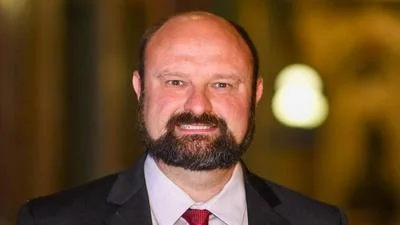Christopher Belt Illinois State Senate District 57 | Official Website
Christopher Belt Illinois State Senate District 57 | Official Website
According to the Illinois General Assembly site, the legislature summarized the bill's official text as follows: "Amends the Prevailing Wage Act. Provides that the definition of "public works" includes all federal construction projects administered or controlled by a public body if the prevailing rate of wages is equal to or greater than the prevailing wage determination by the United States Secretary of Labor for the same locality for the same type of construction used to classify the federal construction project. Makes a conforming change. Effective July 1, 2025."
The following is our breakdown, based on the actual bill text, and may include interpretation to clarify its provisions.
In essence, this bill amends the Prevailing Wage Act to expand the definition of "public works" to include all federal construction projects administered or managed by a public body, provided the prevailing wage equals or exceeds that determined by the U.S. Secretary of Labor for the same locality and construction type. It outlines various funding sources and conditions under which projects are classified as public works, such as those financed by specific bonds or funds, and projects involving renewable energy and electric vehicle infrastructure. The bill mandates compliance with prevailing wage standards for public works, allowing legal action for wage discrepancies, with penalties for non-compliance. It becomes effective July 1, 2025.
Christopher Belt has proposed another three bills since the beginning of the 104th session.
Belt graduated from Illinois State University in 1994 with a BS.
Christopher Belt is currently serving in the Illinois State Senate, representing the state's 57th Senate District. He replaced previous state senator James Clayborne Jr. in 2019.
Bills in Illinois follow a multi-step legislative process, beginning with introduction in either the House or Senate, followed by committee review, floor debates, and votes in both chambers before reaching the governor for approval or veto. The General Assembly operates on a biennial schedule, and while typically thousands of bills are introduced each session, only a fraction successfully pass through the process to become law.
You can read more about bills and other measures here.
| Bill Number | Date Introduced | Short Description |
|---|---|---|
| SB0164 | 01/17/2025 | Amends the Prevailing Wage Act. Provides that the definition of "public works" includes all federal construction projects administered or controlled by a public body if the prevailing rate of wages is equal to or greater than the prevailing wage determination by the United States Secretary of Labor for the same locality for the same type of construction used to classify the federal construction project. Makes a conforming change. Effective July 1, 2025. |
| SB0021 | 01/13/2025 | Amends the Hospital Licensing Act. Defines "hospital worker" as any person who receives an hourly wage, directly or indirectly via a subcontractor, from a hospital licensed under the Act. In provisions concerning limitations on mandated overtime and requiring rest periods for nurses, replaces "nurse" with "hospital worker". Requires additional hospital staffing information to be reported to the Department of Public Health, including any and all staffing matrices, staffing metrics, and underlying materials used to determine the metrics. Provides that the Department shall produce an annual report based on staffing disclosures and make recommendations for minimum staffing standards for hospital workers in each hospital unit. Requires hospitals to conduct a competency validation for each hospital worker hired, as a condition of employment, within the first month of employment and at no cost to the new hire. Provides that each hospital worker's competency validation must be submitted to the Department within 2 weeks after the hospital worker's start date. Establishes ongoing verification requirements for each hospital worker, and requires hospitals to submit a list of all competent employees currently employed at the end of each calendar year. Requires the Department to maintain, and make available to the public, a registry of all competent employees, including the hospital worker's name, address, contact information, and current employer. Provides that hospital employers that fail to comply with the competency validations requirements shall receive a fine equal to 0.1% of annual revenue reported during the most recently completed fiscal year each day until the hospital complies. Sets forth provisions concerning a hospital's requirements regarding assignment despite objection forms, a resolution process under the Department for assignment despite objection for certain hospital workers, and a fine for hospitals that fail to honor the assignment despite objection process. Makes other changes. |
| SB0022 | 01/13/2025 | Amends the Motor Fuel Tax Law. Repeals the definition of "supplier" and related provisions in the Motor Fuel Tax Law that establish various requirements for suppliers. Repeals a provision that prohibits a person other than a licensed distributor from acting as a supplier of special fuel within the State. Changes the definitions of "distributor" and "receiver". |
| SB0058 | 01/13/2025 | Amends the Department of Commerce and Economic Opportunity Law of the Civil Administrative Code of Illinois. Provides that the Department of Commerce and Economic Opportunity shall develop a program of technical assistance in support of regional manufacturing partnerships in collaboration with employer associations representing manufacturers; secondary and postsecondary institutions, including public universities and community colleges; and workforce stakeholders, including local workforce innovation boards and local workforce innovation areas. |






 Alerts Sign-up
Alerts Sign-up